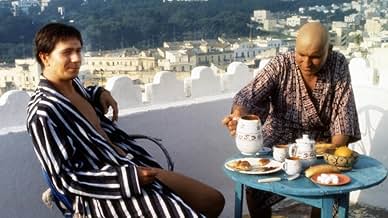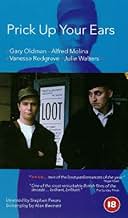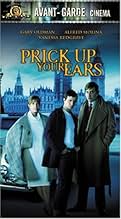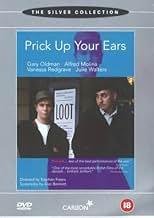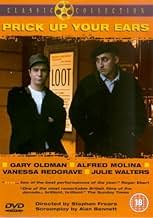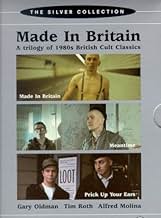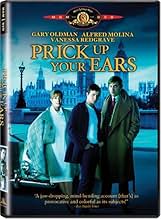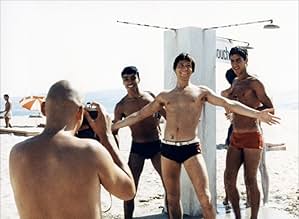Aggiungi una trama nella tua linguaBiographer John Lahr is writing a book about playwright Joe Orton. Joe and Kenneth meet at drama school and live together for ten years as lovers and collaborators. Both want to be writers, ... Leggi tuttoBiographer John Lahr is writing a book about playwright Joe Orton. Joe and Kenneth meet at drama school and live together for ten years as lovers and collaborators. Both want to be writers, but only one of them is successful.Biographer John Lahr is writing a book about playwright Joe Orton. Joe and Kenneth meet at drama school and live together for ten years as lovers and collaborators. Both want to be writers, but only one of them is successful.
- Nominato ai 3 BAFTA Award
- 5 vittorie e 8 candidature totali
Recensioni in evidenza
The screenplay, by Alan Bennett, is based on critic John Lahr's biography of Orton. Bennett makes the writing of the biography part of the story, and briefly tries to parallel the relationship of Lahr and his wife Andrea (played by Wallace Shawn and Lindsay Duncan), but I'm not sure that it helps the film much. Splitting the story's focus in its early sections removes us from Orton himself. That's who we want to stay with. The only real benefit the Lahr section gives us is one wonderful scene between Ms Duncan and the great Joan Sanderson as her hyper-middle class mother, decoding shorthand sections of Orton's diary to reveal highly salacious behaviour. Ms Sanderson's deadpan performance, enthusiastically uncovering Orton's meaning while remaining steadfastly unshocked, is one of the highlights of the film for me.
There are a dozen or so cameos from other wondrous actors, mostly known for their theatre work -- Margaret Tyzack, John Moffatt, Julie Legrand, Selina Cadell -- as well as substantial support from Francis Barber and Janet Dale as, respectively, Orton's warm-hearted sister and eccentric landlady.
Ultimately, the film rests on the shoulders of the central trio: Orton, Halliwell and Orton's agent, the redoubtable Peggy Ramsay. She is played by Vanessa Redgrave in a glowing performance, that helps to hold the disparate parts of the film together.
Molina's work I've already praised. So we're back to Gary Oldman, who is absolutely brilliant as Orton. What Oldman is able to do is to accept, rather than explain, his characters. He thinks it's OK not to make them totally knowable, and he's right.
Director Stephen Frears is equally difficult to pigeon-hole. He favours realism on the one hand, but on the other he is capable of pulling off highly-charged scenes - like the orgy in a public lavatory -- which might floor less gifted artists.
All in all, an entertaining and informative film, not without its flaws. In particular, its depiction of gay men's lives in the late fifties and early sixties is interestingly honest.
The film is quite interesting in what it leaves out - anyone who has read Orton's diaries will know that "the latter part" is rather underplayed here. Also sadly missed is "Mrs Edna Welthorpe" an alter ego of Joe's who would write to newspapers denouncing his plays as filth - a rather cunning way of securing free advertising. A very interesting telephone conversation with Brian Epstein "...one of the boys is happily married..." plays with what we now know about Epstein and Lennon in a beautifully understated way.
Orton and Halliwell's relationship is counterpointed in the film by "John Lahr"'s own marriage (Wallace Shawn is great here too, as always) as Lahr's researching of his biography acts as a framing device for Orton's story. As others have commented, the dynamic of the central relationship rings horribly true to anyone who has been in a halfway similar situation.
It's interesting to speculate on what would have become of Orton had he lived. Time has dimmed the shock value of his plays to the point where they will probably never have the same effect, and despite various rumours (the Sex Pistols?) no-one has picked up the Beatles script, probably for the same reason. Live fast, die young, leave a good looking corpse? Perhaps.
Joe Orton whose work I'd like to see and is curiously unavailable is played by Gary Oldman and we see him as a young writer befriended and mentored by Kenneth Halliwell who is older and played by Alfred Molina. Williams says that in his opinion there is no doubt the influence that Halliwell had on Orton's work. But they were two very different types of personality and probably were fated to come apart. Especially when Halliwell who mentored Orton was not finding any success with his own writing. In the end it destroyed them.
Great Britain had some strict sodomy laws as Oscar Wilde was living testimony to. Gay artists however got different treatments depending on who their patrons were. Oscar Wilde and the Orton/Halliwell duo in their respective generations were treated one way. But Noel Coward moved at the highest levels of British society and he had a Teflon like immunity from what befell the other three.
The film is told in flashback with Vanessa Redgrave as Orton's agent telling his biographer Wallace Shawn what the two were about individually and separately. Both Oldman and Molina were brilliant.
I can't help thinking that if they could have been traditionally married back then, they could also have been traditionally divorced when the love faded. That certainly would have been better all around.
But then we would not have had this fascinating tragedy.
Prick Up Your Ears is a wonderful film about the writer Joe Orton(Oldman) and his lover Kenneth(Molina). The dialogue is smart and the acting is incredible. Rating=4/5
In addition, I would just like to say that teenagers can enjoy decent films. I was twelve when I watched this, and I found it amazing. Its the film that sparked off my fascination with Gary Oldman films.
Lo sapevi?
- QuizAs well as being an actor, Wallace Shawn (John Lahr) is an acclaimed playwright and screenwriter. Until her 1991 death, his theatrical agent was Margaret Ramsay, who was also Joe Orton's agent, and is portrayed in this movie by Dame Vanessa Redgrave.
- BlooperWhen Joe's agent first meets him in 1964, she asks him how he's been supporting himself. He tells her he's on public assistance, getting £3.10 per week. New pence weren't introduced until 1971. However, in the pre-decimal era, "Three pounds ten" would have been understood as "Three pounds and ten shillings", the present-day equivalent being £3.50. For example, "Maggie Mae", recorded by the Beatles in 1969 but based on a much older traditional song, includes the line "Two pounds ten a week, that was my pay."
- Citazioni
[Halliwell puts his hand on Orton's leg. Orton brushes it off]
Joe Orton: No. Have a wank.
Kenneth Halliwell: Have a wank? Have a wank? I can't just have a wank. I need three days' notice to have a wank. You can just stand there and do it. Me, it's like organizing D-Day. Forces have to be assembled, magazines bought, the past dredged for some suitably unsavoury episode, the dog-eared thought of which can still produce a faint flicker of desire! Have a wank, it'd be easier to raise the Titanic.
I più visti
- How long is Prick Up Your Ears?Powered by Alexa
Dettagli
- Data di uscita
- Paese di origine
- Lingua
- Celebre anche come
- Prick Up Your Ears
- Luoghi delle riprese
- Aziende produttrici
- Vedi altri crediti dell’azienda su IMDbPro
Botteghino
- Lordo Stati Uniti e Canada
- 1.654.743 USD
- Fine settimana di apertura Stati Uniti e Canada
- 38.643 USD
- 19 apr 1987
- Lordo in tutto il mondo
- 1.672.927 USD


